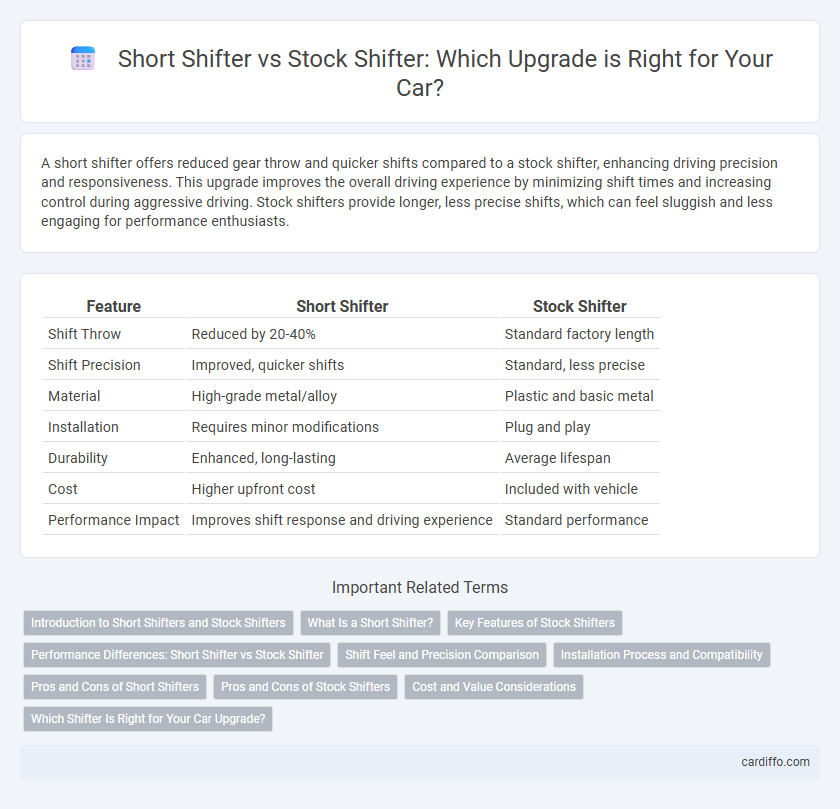A short shifter offers reduced gear throw and quicker shifts compared to a stock shifter, enhancing driving precision and responsiveness. This upgrade improves the overall driving experience by minimizing shift times and increasing control during aggressive driving. Stock shifters provide longer, less precise shifts, which can feel sluggish and less engaging for performance enthusiasts.
Table of Comparison
| Feature | Short Shifter | Stock Shifter |
|---|---|---|
| Shift Throw | Reduced by 20-40% | Standard factory length |
| Shift Precision | Improved, quicker shifts | Standard, less precise |
| Material | High-grade metal/alloy | Plastic and basic metal |
| Installation | Requires minor modifications | Plug and play |
| Durability | Enhanced, long-lasting | Average lifespan |
| Cost | Higher upfront cost | Included with vehicle |
| Performance Impact | Improves shift response and driving experience | Standard performance |
Introduction to Short Shifters and Stock Shifters
Short shifters provide a reduced shift throw length compared to stock shifters, enabling quicker gear changes and improved driving precision. Stock shifters offer a standard factory design prioritizing comfort and ease of use over shift speed. The upgrade to a short shifter enhances the vehicle's performance dynamics by minimizing gear shift travel distance for faster response.
What Is a Short Shifter?
A short shifter is a performance upgrade designed to reduce the distance the gear lever travels when shifting, allowing for quicker and more precise gear changes compared to a stock shifter. By shortening the throw of the gear lever, it enhances driving responsiveness and improves overall control, making it popular among enthusiasts and racers. Unlike a stock shifter, which has a longer throw for smoother everyday driving, a short shifter prioritizes speed and efficiency in gear selection.
Key Features of Stock Shifters
Stock shifters are designed with OEM specifications to ensure smooth, reliable gear changes and maintain factory-level shift quality. They typically feature a longer throw, resulting in more gradual shifts that prioritize comfort and ease of use over performance. Construction materials focus on durability and cost-effectiveness, often featuring standard plastics and metals, which deliver consistent function but lack the responsiveness offered by aftermarket alternatives like short shifters.
Performance Differences: Short Shifter vs Stock Shifter
Short shifters reduce the shift throw length by approximately 20-30%, resulting in quicker gear changes and improved driving responsiveness compared to stock shifters. The enhanced mechanical leverage provides a more precise and firm shift feel, which can lead to better control and reduced driver fatigue during spirited driving. However, stock shifters often offer smoother, more forgiving engagement suited for everyday driving comfort rather than performance optimization.
Shift Feel and Precision Comparison
Short shifters reduce shift throw length by up to 30%, delivering quicker gear engagements and a more connected driving experience. Enhanced shift feel stems from stiffer components that minimize play and provide crisp feedback compared to the often softer and less precise stock shifters. Precision improvements translate to faster, more confident shifts, making short shifters ideal for performance enthusiasts seeking greater control.
Installation Process and Compatibility
Short shifters offer a straightforward installation process often designed to be bolt-on replacements compatible with specific vehicle models, reducing lever throw for quicker gear changes. Stock shifters maintain original manufacturer compatibility and typically require no modifications, ensuring seamless integration with the vehicle's transmission system. Compatibility varies, with short shifters tailored for performance-oriented setups, while stock shifters guarantee standard fitment across a broad range of models.
Pros and Cons of Short Shifters
Short shifters improve gear shift precision and reduce shift throw distance by up to 30%, enhancing driving performance and responsiveness compared to stock shifters. However, they may increase shift effort and cause harsher engagement, potentially impacting daily driving comfort. Vehicle-specific compatibility and installation complexity should be considered before upgrading to a short shifter.
Pros and Cons of Stock Shifters
Stock shifters offer precise engineering designed specifically for each vehicle model, ensuring smooth gear engagement and long-term reliability. They maintain OEM durability and often come with warranties, which can be crucial for everyday driving. However, stock shifters typically feature longer shift throws, reducing shifting speed and driver engagement compared to short shifters.
Cost and Value Considerations
Short shifters typically cost between $100 and $300, offering improved shift precision and reduced throw, which enhances driving performance compared to stock shifters priced around $50 to $150. While stock shifters maintain factory reliability and ease of installation, short shifters provide greater value for enthusiasts seeking a sportier feel and quicker gear changes. The investment in a short shifter balances initial cost with long-term driving satisfaction and potential resale value improvements.
Which Shifter Is Right for Your Car Upgrade?
A short shifter reduces the shift throw distance by 20-40%, providing quicker and more precise gear changes compared to a stock shifter, which prioritizes comfort and ease of use. For performance enthusiasts seeking improved shift response and a sportier driving feel, a short shifter offers significant advantages, especially in manual transmission vehicles. However, for daily drivers prioritizing smooth shifting and reliability, the stock shifter remains a practical choice that balances comfort with functionality.
Short Shifter vs Stock Shifter Infographic

 cardiffo.com
cardiffo.com